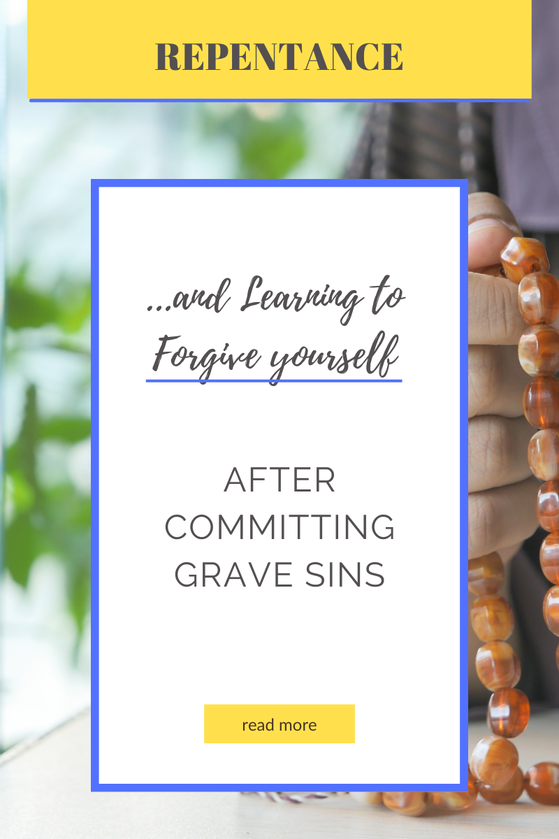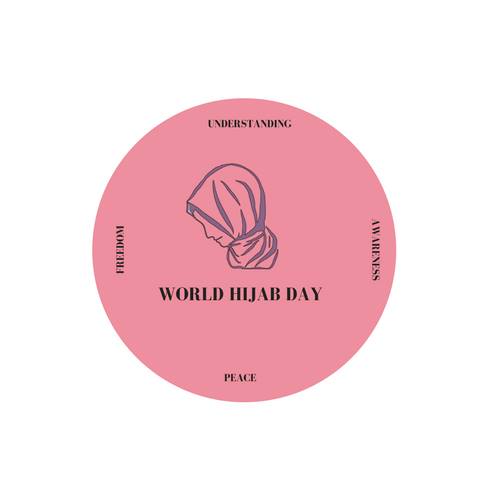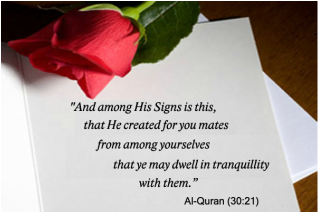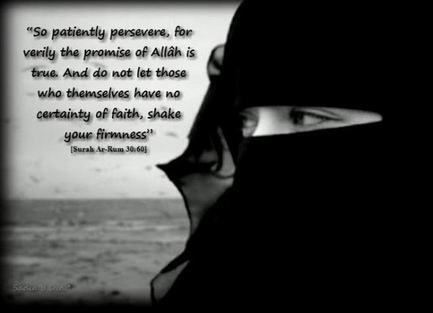|
By: Zaghra Savahl As humans, we sin daily. We are flawed and no one on this Dunya is perfect. It is for this reason that Allah (SWT) gives us numerous ways through the Holy Qur’an to repent and return to becoming closer to HIM. If we are sincere in our action of repentance to the Almighty (SWT), it needs to be done with another action which is – learning to forgive yourself as well. How do we do this? But if the thief repent after his crime and amend his conduct God turneth to him in forgiveness; for God is Oft-Forgiving Most Merciful. Surah Al Maidah: Ayah 39 Allah (SWT) provides us with opportunities to repent as HE is Most Beneficent and Most Merciful. He knows and wants what is best for us. However, there are steps one needs to take in order to gain our Lord’s favor again after committing sins. Some sins are worse than others and require much deeper repentance and action to be able to be forgiven. For the sake of this article, we will be focusing more on major sins as these are the ones that is often most difficult for people to seek forgiveness for and to learn to forgive themselves in the process as well.
0 Comments
Girl With A Scarf Writes:
https://girlwithscarfblog.wordpress.com/2018/01/31/what-happened-when-i-put-a-scarf-on/ Hidden Pearls: https://www.hidden-pearls.co.uk/the-hijab-diaries/world-hijab-day-celebrating-muslimahs/ Mona Ismaeil(The Modern Hijabi) https://www.mymodernhijab.com/single-post/2018/01/31/World-Hijab-Day-What-Does-Hijab-Mean-To-Me Ramsha Rose: http://www.ramshaarose.com/2018/02/my-hijab-story-tag-world-hijab-day.html The Women Network: Understanding Psychological Implications for Women Who Face Hijab Prejudice http://www.thewomenetwork.com/world-hijab-day-understanding-psychological-implications/ And of course, you can read the hijab story of our very own Lady_Meansie: That Thing On Your Head What about you? What led you embracing hijab?
Today I feel like discussing love. The fairytale of all fairy tales, the mother of emotions and the most talked about yet least understood confliction within ourselves. It expands to external sources, too. (Unless you don't love anyone but yourself. In which case, please carry on.) I love Harry Potter. Sometimes I love it so entirely, all-consumingly enough I don't know how I manage to contain those magnificent, indescribable feelings within me. I am a writer, but I have no words to explain how much I love this life changing series that wasn't a book so much as a second life. One things for certain, though: I don't love it more than I love Allah(SWT) and Islam, which is where you should be drawing the line. Love has become an issue that I, albeit my young age (or maybe because of it), perceive to be all too common amongst Muslims nowadays. And you know what? We get it. You sin, I sin, we all sin. We're human. We make errors and sometimes it takes years to get through them, and sometimes you lose so much of yourself it's almost impossible to find yourself again. As I said, we all do it; so no, sinning isn't avoidable. Does that make it okay? No. No matter how many kids fry ants with their magnifying glasses, it will remain a monstrous act. Even if the entire world is dating it will be no less a sin than it was when only you did it. Reconsider your life and your priorities. Who are you sinning for? Is this random guy on the internet worth punishment in the afterlife? Is walking to the park with the new guy worth your parents' pain, disappointment, or anxiety? Is this text conversation worth Allah(SWT)'s anger? Are the severe consequences worth all of this? No, my friends, my dear beloved sisters. It isn't. Islam has given you the moon; we, my sisters, are precious diamonds wrapped in the cleanest of soils where we wait to sprout like flowers in the midst of summer. Do you know what it means to engage in the zina Allah(SWT) has forbidden for reasons He fully understands because He is almighty and we are just specks floating like dust who know nothing about what's right for us? It means you're cutting of your stem, you're tarnishing the sparkly, valuable exterior of your diamond. Do you not deserve better? If you think no, stop. Take a deep breath. Allah(SWT) obviously does, and His word is enough for any of us. SubhanAllah, we are blessed into a religion where our Creator, our God, loves us so much He has instructed us what to do with ourselves. He is always there, looking out for us like the best parents do. If you can't see Him, go through the Qu'ran, hadith, sunnah of Muhammed(SAW). Go through surahs and read their meaning. You will always find Him for He is the ultimate One to whom our love should belong because there is nothing He hasn't done for us (or isn't saving for a later time that He knows is best for us). That's a promise. SOMETHINGS TO LEAVE YOU WITH:
If ye fear that ye shall not be able to deal justly with the orphans, Marry women of your choice, Two or three or four; but if ye fear that ye shall not be able to deal justly (with them), then only one, or (a captive) that your right hands possess, that will be more suitable, to prevent you from doing injustice. Qur'an 4:3 " I recall telling friends, “Maybe when I get older I will consider polygyny. I don’t think I will want someone up under me all of the time.” Then, I met my husband. I did not expect to like him as much as I do. MashaAllah!
For those who knew me, my openness to polygyny was not a secret. I had previously been exposed to it personally, both in a negative and positive light. Unbeknownst to me, this exposure prepared me and provided insight that I could not have developed independently. I learned what to do and what not to do. Some skills imparted to me by my personal circle of Muslimahs and elders would benefit any marriage. However, I also know polygyny has its own set of experiences. Some of which, one cannot prepare for without the help of Allah. No, I did not plan to be in a polygynous family. I planned, inshaAllah, to marry a man who pleased Allah and could please me. I prayed for the moment for years. I did not pray for him to be unmarried. I left out a key detail! One must be specific with duas! Prior to marriage, my husband informed me of his marital status. He was happily married and had been for 6 years. I appreciated the loving manner in which he described his wife. He never spoke negatively of her. Alhamdulilah. Clearly, this appealed to me. He had experienced polygyny before and did not negate its sensitivities. He explained his role and how important it was. He informed me of his preferences for the relationship between his wives. He had other benefits I found attractive. His existing wife knew of his intent to add on to his family. He made it clear he wanted two wives but would have one family. I knew this required a level of cooperation which I had not planned to do. I informed him I had no intentions of seeking to be her best friend. I had collected good friends and retained them for over 30 years. These relationships could not be replaced. I explained I likely would not go grocery shopping with her. Yet, I would surely be respectful, kind and sisterly. I had been given the option to speak with her prior to our marriage. I delayed doing so for months. To date, I do not know my reason. I just wasn’t ready it seems. What do you say to a potential co-wife during the first conversation? No script exists for this. A month prior to our nikkah, I requested to talk with her. We chatted on the phone for over an hour. As I made plans to relocate, she assisted me with identifying housing. When I visited the state to secure my relocation, she drove me around. We went to lunch. She took me to her place of business. Five months from the date of the initial introduction to my husband, we married. This is the final installment in the "Marriage Series". Here are part 1 and part 2. " So you’ve found the person you want as your future spouse, you’ve asked them all of the proper questions and you’ve decided to get married. Now it’s time to plan the wedding. According to Islam, in order for a man and woman to be married, a nikkah must be conducted. In Islam, marriage is considered a contract and there are various components of this contract. The first is the proposal: This is when the man asks a woman for her hand in marriage, and as a form of respect, her family as well. Once the woman has accepted, they are now ‘intended’ and it is not permissible for another man to propose to her. It is important to note that although the two individuals have agreed to marry one another, they are still non-mahram to each other. The woman has no rights over the man and viceversa. They are not to be alone together or physically interact and they should still observe hijab around each other. The second component is the mahr: After the proposal has been accepted, the man offers the intended wife a mahr. In the Qur’an we’re told: And give women their Mahr as a free gift, but if they of themselves be pleased to give up to you a portion of it, then eat it with enjoyment and with wholesome result. Qur’an 4:4. " Although in recent times, it has become common for the woman or her parents to request a certain ‘amount’ from the future husband. It is actually of the Sunnah for the intended husband to offer a certain mahr to the woman. She then has the opportunity to accept or decline it. When it comes to the mahr, a few things must be remembered, such as: that both individuals must consent to the mahr, not their parents, that the mahr is her right and she should not be made to feel guilty for wanting one and that the mahr is a gift, it is not her dowry or bride price. There is no ‘limit’ on what the mahr can be, it can be cash, a certain item or something non-tangible like the teaching of some knowledge or recitation of a certain sura from the Qur’an. The mahr can be given right away or promise can be made(prior to the nikkah) for the mahr to be given later at a certain time. It is highly recommended though, that the mahr be given prior to the nikkah or at the nikkah.
After the proposal and mahr have been accepted, the third and final mandatory component is the actual nikkah ceremony. The nikkah can take place anywhere that is halal(i.e not a bar or a club but in your home, the masjid, a hall, etc) and it is to be performed by an imam or qadi. Unlike marriage ceremonies of other faiths, there is no ‘walking down the aisle and’ there are no bridesmaids or groomsmen. The only individuals who need to be in attendance are the officiant, the two individuals that are marrying each other, two Muslim witnesses and the wali(Muslim guardian who is related to the woman-it can be her father, brother, uncle, etc) or the wakil(a Muslim guardian who is not related to the woman, generally for Muslim women who do not have any ‘practicing’ Muslim male relatives). At the nikkah, a khutbah(sermon) is usually given in which the officiant generally speaks about the virtues of marriage, the rights of the spouses and other aspects of Marriage in Islam. After the ceremony is given, the officiant asks the woman if she has agreed to the mahr and consents to the marriage. She should respond with “I have given away myself, in Nikkah, to you, on the agreed mahr”. The man then immediately responds, “I have accepted the nikkah”. With these short statements, they are now husband and wife. After the nikkah, either on the same day or sometime later, a walima is held. The walima is essentially a feast that the groom offers to announce the marriage. The walima is not mandatory but it is highly recommended. Regardless of the individuals’ culture, the walima should abide by Islamic guidelines. There should be no alcohol, lewd music, inappropriate attire, etc. As with all gatherings, it is advised that men and women should be separate. This is the first article written by new site contributor Chib. Take the time to read the article and leave your feedback in the comments section..." The first time that I wore a headscarf to cover my hair, I was at the mosque ready to take my Shahadah. I looked at myself and fumbled around with the scarf making sure none of my baby hairs were poking out. The lighting was dim and unforgiving; it made my skin look blue. I looked up at the mirror and stared at myself long and hard. I remember wondering who this person was. My cheeks looked hollow and my eyes had bags from the lack of sleep I had been dealing with. I didn’t know who this person staring back at me in the mirror was. This person staring back at me wearing a scarf wrapped around her head, I felt naked and exposed to the world even though I was fully covered from head to toe. I felt like everyone had a chance to view into my soul because they weren’t being distracted by my looks and could only focus on my eyes. I felt vulnerable. After taking my Shahadah I went to go celebrate at a restaurant. I felt like everyone was staring at me even though they probably weren’t. I kept my eyes down and I felt so unsure of who I was. Who was I anyway? If I could line myself up with the different versions of me from my past we would all look different. My old confidence had dwindled and I had to rebuild myself again but this time with different foundations. I had a lot of work to do.
The clothing we use to observe hijab, the khimar, abaya or niqab has more meaning than just being pieces of cloth. With hijab comes great responsibility. Sound familiar? That’s because there’s more to just wearing the hijab than this society lets on. Hijab is about working on your entire being, this includes manners, and the way we present ourselves in the public eye, our attitudes and behaviors. When observing hijab, we must remember that most importantly we are a representation of our faith. We represent what a Muslim women looks like how she acts and treats others and if that’s not a blessing within itself I don’t know what is. I have had a lot of Muslim women talk to me about how they started observing hijab and how it made them feel a little self conscious about themselves. As well as other sisters who are not ready for hijab because they don’t feel like they are spiritually there yet. But the most talked about subject is how hijab makes them feel less appealing to themselves. I can understand why this is, this whole world and society puts a lot of emphasis on the way women portray their bodies to the outside world and to our own selves. Sometimes we forget that Allah has blessed us with hijab and teaches us that our bodies are only meant to be shown to those who are most special to us like our families and husbands but most importantly, observing hijab is about pleasing our Creator. Sometimes we get so caught up in picking the right scarf or longing to wear the outfits we were able to wear before committing to hijab. We get lost and forget that hijab is given to us to please Allah (SWT) and that it could be the one deed that gives us access to jannah. My confidence dwindles when I am not able to be a part of everyone else and I feel like an outcast because I cannot just curl my hair and go outside or wear shorts on a hot day. As a Muslim woman I must take pride in my hijab and build my confidence around the deen and use Allah as my foundation. It is important for us as Muslim women to not dwell or focus on the things that we can’t wear because we are observing hijab. Hijab paves the way towards our Creator, it pleases Allah (SWT) and we should smile and thank Him because He has made us beautiful and perfect in every way possible with hijab so let our confidence stand strong and rely on our faith not on our outward appearances. How has hijab impacted your confidence has it made it grow or where there times where it made you question who you are?
"And marry women except those your right hands possess. the decree of Allah upon you. And lawful to you are [all others] beyond these, that you seek them [in marriage] with your property, desiring chastity, not unlawful sexual intercourse. So for whatever you enjoy [of marriage] from them, give them their due compensation as an obligation. And there is no blame upon you for what you mutually agree to beyond the obligation. Indeed, Allah is ever Knowing and Wise." Qur'an- 4:24 A common range of thinking among young unmarried Muslim women who are interested in getting married consist of "how will I meet my husband?"," what shall I tell my parents?", "what about if they don't find anyone?", "what about if they won't accept my classmate as my husband?", or what if they won't accept a Muslim man?(An issue many reverts deal with). Often we experience a rashness when it comes to finding a husband and the longer it takes, the more worse we feel. It is important though to remember that choosing a spouse is a monumental decision that that should not be made hastily due to the immense impact that it has on ones life Allah(SWT) tells us: "Seek Allah's help with patient perseverance and prayer. It is indeed hard except for those who are humble." Qur'an-2:45 Yes, Allah(SWT) reminds us to be patient. At times being told to be patient can be very hard to hear but remember that Allah(SWT) knows best, and Allah(SWT) will send you the right one at the right moment. When I was searching for a spouse, I used to cry a lot when others told me "don't worry he will come in the right moment!" because I was in such a hurry to get married. It was so complicated living in this dunya. Remember though sisters, if you do not take the time and do your due diligence when it comes to choosing your spouse, the end result might not be great. Remember that this person will be the head of your household, he will be your wali and he will be an example for your children. These reasons showcase the importance of carefully choosing. When trying to find a spouse, it is necessary to remember to trust in Allah. Yes it might be difficult, but it is the best way to proceed. When the process gets difficult, do not become overtly upset and do not lose faith, but remember that Allah(SWT) has someone waiting for you, someone that will be a great match, someone who is meant to be your husband. After realizing the importance of patience and deciding how you will proceed, the next concern for some women is what to tell their parents about their interest in someone. The first thing to do is relax and talk to your mother or father, whichever one you feel the most comfortable with. It might be better though to talk to your mother simply because she might understand more since she is woman of course and will have knowledge on the topic. Tell her you want to talk to her about something important but in private, at that moment she will start to suspect or at least she will know it is something you need her advice on. When the moment comes tell her and don't be nervous. Talk to her about how you feel at this moment and why you would like a husband or if you have already found a brother that you are interested in, talk to her about him, how did you meet and why you like him. As your father is your wali, be sure to talk to him as well about the brother and arrange for them to meet. inshaAllah, all will go well. For further information on dealing with parents and marriage, take the time to read "Marriage Series Pt.2: The Role of Parents in The Courtship Process" by JMuslimah After years of carrying the burden of knowing but not practicing, Alhamdulillah, Allah(SWT) finally made me come to a point where I could no longer resist wearing a niqab. All of the excuses that I previously had began to fade away, such as: how would I be able to breathe with a cloth hanging over my face, how would my family react, especially my father, how would I handle situations where I had to show my face for identification purposes? Questions like these were constantly pouring into my head. I realized that I had to be 200% sure about wearing the niqab because this important decision had to be the same as covering my hair: Once and forever! I realized that despite all the doubts that a person has, when you are sincere and you want for yourself what your Creator wants from you, eventually all these doubts begin to vanish because truly, Allah(SWT) knows what's best for us. After all, He did make us. He sent to us our manual for life, The Holy Qur’an. We’ve all read the verses in regards to the rules of covering and subahnaAllah, they are so clear. Even though people try and interpret the rulings on covering the face differently, we all know that all scholars have agreed that it is necessary in times of fitnah. In my opinion, fitnah is everywhere. With modern technology and the usage of television and the internet, it’s becoming harder to avoid fitnah. Even without the presence of TV and the internet, most men refuse to lower their gaze and while we cannot control the actions of men, we can control what we allow them to gaze at. As women, we all know that our immediate external beauty lies in our face. As a woman who spent about 18 years with only covering my hair, I know what it is like to be in the market, on the street, coming in contact with the opposite gender! There's always this feeling of being stared at just because you wear a headscarf. You become more interesting for men. Even if they ignore you, or at least you think so,you can't stop the feeling of knowing that you’re continuously being watched! It's a kind of slavery in my opinion. Wearing the niqab though, releases you of those kind of chains, because you know they cannot judge you anymore because your beauty is hidden! With Allah's guidance, my desire to observe the niqab increased. I began to watch all kinds of videos concerning the niqab, experiences of sisters, debates and so on. The more I read about it, the more I came closer to wearing it. My desire for niqab rose up from where I buried it in my heart. During these last three months of wearing the niqab, I noticed that I became more careful about where I look. You do not want men to think that even if they cannot see you, you are looking at them!Lowering your gaze becomes more important in your life.. Which I hope will get us closer to Allah(SWT) and essentially, that’s what really matters. Allah’s(SWT) pleasure! From this moment on, until the moment when my soul is taken from me, I will, inshaAllah, continue to wear the niqab. Ya Allah! Give me strength and wisdom on Your path. Ameen. I want for all my sisters in Islam, what I want for myself. I really hope that those who are aware of the importance of niqab will not wait as long as I did to begin wearing it. May Allah(SWT) guide us all and never let us go astray. WE need HIM, and to Him only on our own is our return. JazaakAllahumul khayr and Wa's salaamu alaikum! What are your thoughts on Mariam's journey? Have you ever considered wearing the niqab? For our non-Muslim readers, what is your opinion on the niqab? This is a continuation of the article "Show Me More: Mariam's Story", an account of Mariam's journey to wearing the niqab. Striving For Clarity will be sharing personal experiences from readers regarding issues that are addressed on the site. If interested in sharing you story about reversion, hijab, marriage, courtship, or submission, email us at jmuslimah.halimah@gmail.com " This is an account of Mariam's journey to wearing the niqab. Striving For Clarity will be sharing personal experiences from readers regarding issues that are addressed on the site. If interested in sharing you story about reversion, hijab, marriage, courtship, or submission, email us at jmuslimah.halimah@gmail.com " Bismillahirrahmanirrahim.
Assalaamu alaikum! I would like to share with you my story about my long journey to finally wearing the niqab.. I was born and raised in the Netherlands and began covering my hair on the first day of Ramadan of 1996.... After my grandpa died.. He always asked me so caring and softly "Why dont you cover your hair my daughter.?" His death would become my birth alhamdulillah.. May Allah(SWT) reward him with Jannah.. My first step towards Allah was actually starting with prayer, salaat.. When we take only one step towards Him with sincerity, He approaches us even more! For sincerity is the most important thing in our worshipping Allah swt, because those are the ones Satan has no power over.(Qur'an 15:39-40) Before my grandpa died a woman we knew asked me: "Do you love God?" "Of course I love Him!" I replied. You know what she said?... "No you don't! If you'd love Him, you would wear hijab!"... Interestingly, this woman wasn't even Muslim!! SUBHANALLAH. It was Allah(SWT) who made her say that of course. I had to prove my love for Him.. And it really hit me in the face. When my parents went to my grandfather's funeral I began wearing my precious gift: My scarf. Step two! Truly, Allah guides whom He wishes.. All praise to Him! So we keep on asking for guidance.. These main change in a person's life are those that people can witness with their own eyes. After this, their attitude starts to change. And you come to know your real friends. But! No problem. As time went by, I met my beloved sister Soha from Egypt.. She was married to Dutch revert, mashaAllah. When she came to visit us one day, we had a conversation about the niqab.. She wasn't sure about it's necessity, while I in fact was convinced that it had to be fard. And I wasn't even wearing it! I told her about why I believed it was the way a Muslim woman should cover herself. I gave her some examples such as: -The Prophet(SAW) told the Muslim women to uncover their faces during ihraam (sacred state while performing hajj) "So they must have been covering their faces!" I said. -All scholars agreed with the obligation of niqab if the woman's face is so pretty that it would cause fitnah. "Please tell me, which part of our body is most beautifull? And we all know a woman gets even prettier if only her face is shown.. And finding someone pretty is a matter of opinion!" These, among many others where some of the reasons I gave her as we continued our discussion on the issue. But when my dearest friend Soha called me a few weeks later that she was wearing the niqab now, I was shocked! I was happy! I felt ashamed! I was ashamed by the fact that I was convincing someone to do something that I, myself wasn't even capable of. Mainly because I didn't have the courage! May Allah(SWT)forgive me.. "I always felt something was missing and I was afraid of dying like that, but now I feel complete! And I am not afraid anymore. I know now, THIS is the way of covering Allah wants from us." These were Soha's remarks in regards to what made her wear niqab. From that moment on (that was about more than at least twelve years ago( until the day that I finally made up my mind and decided to wear niqab, I carried the burden of this 'incident'.. But now I finally feel free!!!............... *The rest of Mariam's niqab journey will be posted soon inshaAllah. Also, Maryam is not her real name but has been chosen in order to preserve her anonymity* "Best of woman is who does not look at man, nor does she allow men to look at her" Fatima(RA)-Daughter of the Prophet(SAW)" We’ve all seen them. Those women who are clad in all black. Those women who wear gloves and socks in 80 degree weather. Those women who the only thing you can see of them is their eyes. Those women are all wearing the niqab(face covering that leaves a slit open for the eyes). In Islam, there are various opinions in regards to whether or not it is obligatory to wear it. All reputable scholars, based on the Qur’an and Sunnah, are in agreement that all Muslimahs should observe hijab, which at minimum consists of the khimar and the jilbab. All scholars are also in agreement that all of the Umm ul-Mumineen(Mothers of the Believers/ wives of the Prophet(SAW) wore the niqab. Many scholars are of the opinion that niqab is not fard BUT it is better to wear it, especially in the west where it is the norm to gaze upon members of the opposite sex. Also, the niqab does not have to be black. At the end of day, whether or not you think niqab is fard, there is nothing wrong with wearing it and the chances of you causing fitnah is lowered.
The niqab is often seen as something extreme by Muslims and non-Muslim. Something that is extra and not really necessary. Despite our opinion on the matter, we should not look down upon those who observe niqab nor should we consider them extreme simply because they choose to cover their faces. We don’t know what their intentions are but we do know that Allah(SWT) has guided them towards it and should therefore be happy for them. Many people think that munaqabat(those who wear niqab) are these raging haram police-like women who don’t smile or socialize and are always waiting to criticize. Yes, there are some who are like this but you can find that among those who don’t wear niqab as well. Some also think that these women are stupid, brainwashed and oppressed. In actuality, that is no where close to being true. Most of the munaqabat that I know are the most kindest individuals and are really fun to be around and many of them are university graduates. Some munaqabat believe that it is mandatory to wear the niqab and some just feel like when they were only observing hijab, they still received unwanted glances so they decided that by covering their faces, even if people looked, they wouldn’t be seeing much. Based on the Qur’an and Sunnah, I do not think that it is obligatory to wear the niqab but I do think it is highly favoured and something that, if done for the sake of Allah(SWT), will result in major ajr(reward) for you. Have I thought about wearing the niqab? Yes, definitely. That is not something that I share with most people, which I’m sure you’ll know why if you’ve read the posts about my hijab journey. I don’t see anything wrong with niqab. Wearing it actually kind of makes sense. When someone is checking someone out, usually the first thing that they will look at is their face because that is wear outer beauty mostly lies. So if I’m trying to reduce fitnah and be as modest as possible, the logical decision is to cover my face. Besides, the Umm ul-Mumineen were munaqabt and they are considered to be the best examples of Muslim women so shouldn’t we all aspire to be like them in every way that we can? |
INTRODUCTIONThe "Muslimah Worries" section of Striving Clarity is dedicated to discussing the things that Muslimahs often worry about from hijab to marriage to how to remain spiritual when you're unable to pray. Join us! Archives
October 2022
Categories
All
|







 RSS Feed
RSS Feed